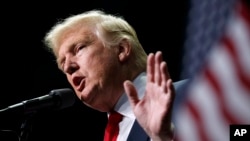As a presidential candidate, Donald Trump repeatedly stressed the need for the president to be unpredictable when it comes to foreign policy. It seems he has succeeded.
With eight weeks to go until Trump enters the White House, many foreign policy experts concede they have no idea what kind of foreign policy he'll oversee.
"It's sort of like a new form of Kremlinology, trying to decipher which way he's going to go," joked Daniel Larison, senior editor of The American Conservative magazine.
Trump, a billionaire businessman who portrays himself as a master negotiator, has embraced two distinct and seemingly contradictory approaches to foreign policy.
At times, he calls for showing more restraint in the world, arguing that the U.S. has focused too much on building up other countries and not enough on itself.
On other occasions, Trump swings wildly in the opposite direction — for instance threatening to massively bomb Islamic State territory and work with American companies to "take the oil."
Backing away
Since winning the election, Trump appears to have backed away from, or least de-emphasized, some of his more extreme foreign policy proposals made during the campaign.
At the same time, though, the president-elect also has begun to fill out his new administration with several national security hawks, whose appointments seem to contradict a noninterventionist approach to the world.
Most notably, Trump chose retired Lieutenant General Mike Flynn to serve as national security adviser and Congressman Mike Pompeo of Kansas to head the CIA.
Neither man's record suggests an isolationist worldview.
Both oppose the Iran nuclear deal, and they have suggested regime change as a way to keep Tehran in check. Pompeo has suggested bombing Iran's nuclear facilities. Both men also have advocated for a much tougher approach to fighting the Islamic State terror group.
Some of those views are more aggressive than that of outgoing President Barack Obama. But they're not exactly a rarity within the U.S. defense establishment, The American Conservative's Larison said. He predicted Trump would continue more of Obama's policies than many people expect.
No 'wholesale repudiation'
"What you're seeing with these appointments is people who are generally in agreement with the overall foreign policy consensus in Washington. Where they differ, it seems to be mostly differences of degree or tactical differences," he said. "It's not going to be a wholesale repudiation of basic assumptions about the U.S. role in the world."
That assertion was backed up this week when Trump named South Carolina Governor Nikki Haley to serve as U.S. ambassador to the United Nations. Like Pompeo, Haley comes from the more establishment, hawkish wing of the Republican Party.
But do Trump's appointments really suggest that his interventionist inclinations have won out over his isolationist ones? Not necessarily, said Elizabeth N. Saunders, a professor at George Washington University.
"There's contradictions within what Trump has said, [and] there's contradictions contained in his appointments. I just don't think we know yet," said Saunders, who also is a visiting fellow at the Council on Foreign Relations.
Additional signs about Trump's foreign policy priorities will emerge when he names more of his political allies to high-level positions, including the heads of the Defense and State departments.
Those looking for Trump's behavior to become any more predictable, however, may be waiting a while, according to Saunders, who pointed out that the president-elect seemed to have embraced impulsiveness as a strategy.
"I think the new watchword for American foreign policy is unpredictability," she said. "And it is going to be a very interesting experiment."
No surprise
The strategy can't have come as much of a surprise — Trump himself has been boasting about it for months, including during his first major foreign policy address in April.
"We must as a nation be more unpredictable. We are totally predictable. We tell everything. We're sending troops? We tell them. We're sending something else? We have a news conference," said Trump.
Trump promised that under his administration, reliable patterns would end.
"We have to be unpredictable," Trump said, waving his index finger in the air to make the point. "And we have to be unpredictable starting now."




